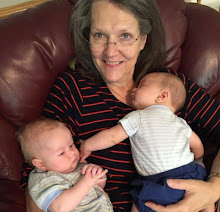THE ORIGINS OF THANKSGIVING IN AMERICA
http://homepages.rootsweb.ancestry.com/~homespun/tg.html
The Pilgrims set ground at Plymouth Rock on December 11, 1620. Their first winter was devastating.
At the beginning of the following fall, they had lost 46 of the original 102 who sailed on the Mayflower. But the harvest of 1621 was a bountiful one. And the remaining colonists decided to celebrate with a feast -- including 91 Indians who had helped the Pilgrims survive their first year. It is believed that the Pilgrims would not have made it through the year without the help of the natives....
This "thanksgiving" feast was not repeated the following year. But in 1623, during a severe drought, the pilgrims gathered in a prayer service, praying for rain. When a long, steady rain followed the very next day, Governor Bradford proclaimed another day of Thanksgiving, again inviting their Indian friends.
It wasn't until June of 1676 that another Day of Thanksgiving was proclaimed. On June 20, 1676, the governing council of Charlestown, Massachusetts, held a meeting to determine how best to express thanks for the good fortune that had seen their community securely established.
By unanimous vote they instructed Edward Rawson, the clerk, to proclaim June 29 as a day of thanksgiving. It is notable that this thanksgiving celebration probably did not include the Indians, as the celebration was meant partly to be in recognition of the colonists' recent victory over the "heathen natives"
October of 1777 marked the first time that all 13 colonies joined in a thanksgiving celebration. It also commemorated the patriotic victory over the British at Saratoga. But it was a one-time affair. George Washington proclaimed a National Day of Thanksgiving in 1789, although some were opposed to it.
There was discord among the colonies, many feeling the hardships of a few Pilgrims did not warrant a national holiday. And later, President Thomas Jefferson scoffed at the idea of having a day of thanksgiving. It was Sarah Josepha Hale, a magazine editor, whose efforts eventually led to what we recognize as Thanksgiving.
Hale wrote many editorials championing her cause in her Boston Ladies' Magazine, and later, in Godey's Lady's Book. Finally, after a 40-year campaign of writing editorials and letters to governors and presidents, Hale's obsession became a reality when, in 1863, President Lincoln proclaimed the last Thursday in November as a national day of Thanksgiving.
Thanksgiving was proclaimed by every president after Lincoln. The date was changed a couple of times, most recently by Franklin Roosevelt, who set it up one week to the next-to-last Thursday in order to create a longer Christmas shopping season.
Public uproar against this decision caused the president to move Thanksgiving back to its original date two years later. And in 1941, Thanksgiving was finally sanctioned by Congress as a legal holiday, as the fourth Thursday in November.


No comments:
Post a Comment